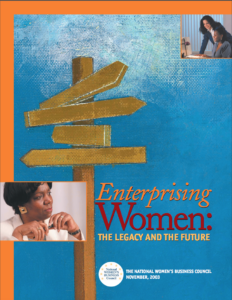 Enterprising Women: The Legacy and The Future
Enterprising Women: The Legacy and The Future
National Women’s Business Council
First published November 2003
A series of roundtable discussions with women entrepreneurs and others in the women’s enterprise community provided a revealing perspective on the tremendous accomplishments of women entrepreneurs since this Nation’s founding, as well as the challenges faced by women business owners today and how those challenges can be better met in the future.
The discussions, which were held in conjunction with the exhibit “Enterprising Women: 250 Years of American Business,” were conducted by the National Women’s Business Council (NWBC) between February and August 2003 and took place in Lexington, Massachusetts; New York, New York; and Atlanta, Georgia. The “Enterprising Women” exhibit was developed by the Schlesinger Library of the Radcliffe Institute at Harvard University and documents the dynamic legacy of women in business over the last two and a half centuries—from pioneers such as Mary Katherine Goddard, who published the first signed copy of the Declaration of Independence to modern-day icons such as Katherine Graham and Oprah Winfrey. The exhibit tells a compelling story of the challenges and successes of women as business leaders and provides a historical context for many of the issues still faced by women business owners.
Women entrepreneurs have long played a vital role in shaping America’s economy, proving that women have been and are highly successful and competitive business owners. The exhibit recounts the challenges and hardships faced by these women as they struggled to start and sustain their businesses. Their accomplishments helped pave the way for women business owners today. But, as was evident from these roundtable discussions, there are still barriers to overcome.
“These discussions provided a unique way in which to hear women’s reflections on the history of women entrepreneurs in America and to talk with them about the issues they face as business owners today,” said Marilyn Carlson Nelson, Chairman and CEO of Carlson Companies and Chair of the National Women’s Business Council. “The discussions provided insights about issues that have previously been identified as important and are helping us to form policy recommendations to encourage further growth of women-owned firms in the U.S.”
In reflecting on the exhibit, discussion participants noted the great achievements of women business owners throughout American history and how the landscape has changed over the past 250 years. Social and legal advancements for women, for example, have made possible the phenomenal growth in the number and economic impact of women-owned businesses. Further, the types of businesses that women own have diversified into almost any field imaginable.
Participants noted that many issues have not changed much for women business owners through the years, such as the challenge of balancing business ownership with family life. Participants also noted that utilizing personal networks and mentoring relationships has been a constant factor in women business owners’ success over the years.
These discussions then focused on the issues that are most pressing for women business owners today, which tended to include concerns shared by all small business owners, rather than issues that are unique to women. Participants were particularly concerned, for example, with the high and rising costs of health insurance, payroll taxes and other costs associated with doing business, and doing business in the current economy. Participants also raised the issue of government contracting opportunities for women, noting that there are too few contracting opportunities overall and that the five percent goal for Federal contracting with women business owners is alarmingly low. Additionally, they strongly felt that the process for achieving business certifications—such as women- or minority-owned business certifications—was too cumbersome and not always beneficial.
